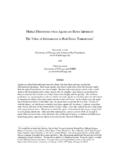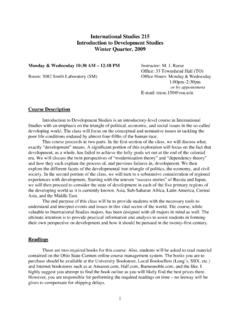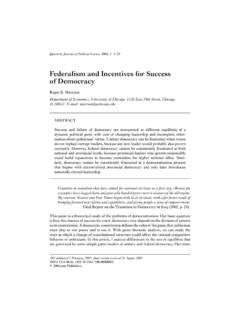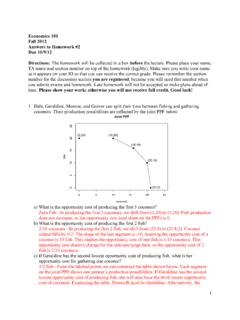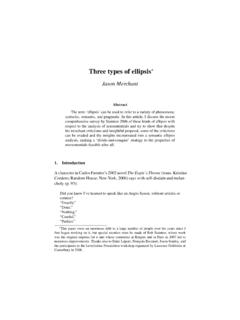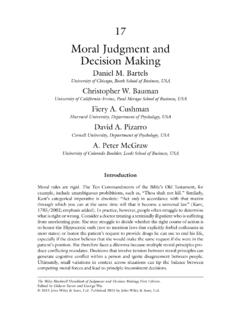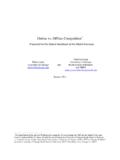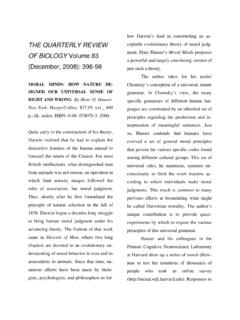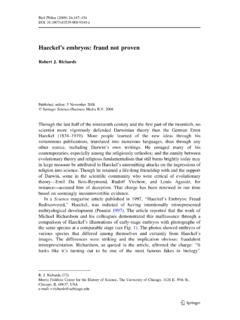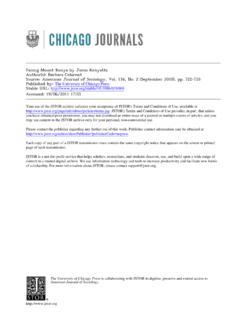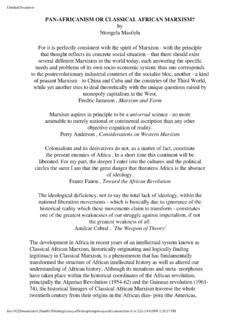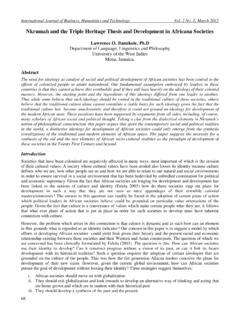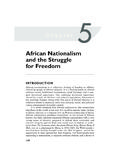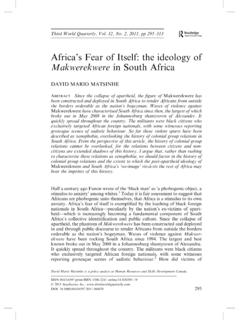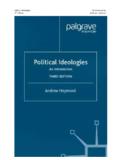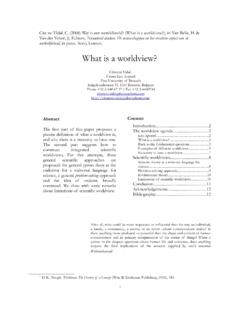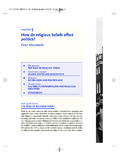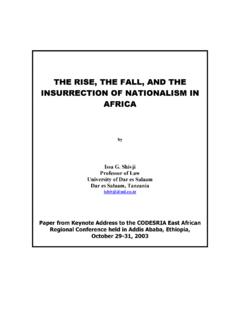Transcription of WHAT IS IDEOLOGY? - University of Chicago
1 what IS IDEOLOGY? John Levi MartinUniversity of Chicago , Chicago , Illinois, United States of ideology has been a confusing topic for social analysts, and those whoattempted to eschew judgmental reductions of others conceptions and develop a non-polemicalpolitical psychology found ideology behaving in ways that defeated their theories of politicalreasoning. I argue that political ideology can best be understood as actors theorization of theirown position, and available strategies, in a political , political parties, political ideologia pol tica tem sido um tema confuso para os investigadores sociais e paraaqueles que tentam evitar julgar as limita es de outras conce es e desenvolver uma psicologiapol tica n o pol mica que procure encontrar um comportamento ideol gico que ultrapasse asteorias do racioc nio pol tico. Defendo que a ideologia pol tica pode ser melhor entendida comouma teoriza o da posi o dos pr prios atores e de estrat gias dispon veis no campo pol , partidos pol ticos, psicologia pol sum Le th me de l'id ologie politique suscite la confusion chez les chercheurs sociaux et chezceux qui s'efforcent d' viter de juger les limites d'autres conceptions et de d velopper unepsychologie politique non pol mique, afin de trouver un comportement id ologique qui d passeleurs th ories du raisonnement politique.
2 Je soutiens que l'id ologie politique peut tre mieuxcomprise en tant que th orisation de la position des acteurs eux-m mes et de strat gies disponibles,dans le champ politiqueMots-cl sid ologie, partis politiques, psychologie ideolog a pol tica ha sido un tema confuso para los investigadores sociales y paraaquellos que intentan evitar juzgar las limitaciones de otras concepciones y desarrollar unapsicolog a pol tica no pol mica que busque encontrar un comportamiento ideol gico quetrascienda las teor as del raciocinio pol tico. Defiendo que la ideolog a pol tica puede ser mejorentendida como una teorizaci n de la posici n de los propios actores y de estrategias disponiblesen el campo pol a , partidos pol ticos, psicolog a pol , PROBLEMAS E PR TICAS, n. 77, 2015, pp. 9-31. ways of conceptualizing ideology1It is common for sociological discussions of ideology to begin by acknowledging,if not bemoaning, the plurality of different ways of using the term ideology (Eagleton 1991).
3 Marx and Engels used it to denote the most abstract conceptionsthat populate an imaginary world of ideas independent of material life; laterMarxists often used it to denote a conspiratorial ideational wool pulled over theeyes of the masses; political scientists use it to denote packages of positions, oftenbelieved to be unifiable in a single preferred optimal state, and, of course, many ofus use it to denote the beliefs, attitudes and opinions of those with whom conventional solution in sociology to these problems comes from ournomi-nalistepistemology that is, we tend to assume that general theoretical terms mustbe created by the analyst and are heuristic devices used to greater or lesser successin particular analyses. Thus we assume that each investigator is basically free tochoose how to define his or her terms, and the worst that we can say regarding aparticular case is that the definitions didn t help there are some good reasons for accepting such a nominalist position,but it is far from obviously the best one for the social sciences, and there is much torecommend a quasi realist position instead.
4 That is, we assume that the generali-ties that we talk about are not open to definition at the whim of the investigator, butare treated as largely pre-given. It is worth emphasizing that this sort of realism (asopposed to nominalism) is separable from the issue of realism as opposed toideal-ism(for more on this distinction, see Martin, 2014). For example, many sociologistsare being realists inthis(anti-nominalist) sense when they argue that sociologistsshould focus on the categories ( emic ) that are used by actors. Even though someof these sociologists may be more like idealists in that they argue that all the cate-gories thatactorsuse are (potentially) disconnected from material reality, theinves-tigatoris not free to define categories for his or her particular analytic purposes, butmust be guided by the externally created ones. Thus if a certain group has a defini-tion of witch, the investigator must attempt to grasp this, as opposed todefiningwhat counts as a witch for her purposes of field theorists, following Bourdieu ( , 1984 [1979]), have such a realistposition regarding the nature of some of the key constructs they use to understandsocial action (though some, like Wacquant, 2002, and Bourdieu himself, will criti-cize certain other definitions used by the actors they study, specifically, those inwhich some sort of bad faith is inherent; Wacquant, 1999: 276, has a clear defenseof a rationalist interpretation of Bourdieu that is, one that privileges a coherentand defensibly true vision of social conflicts).
5 In particular, the endogenous defini-tion of the stakes of any field, and what capital can be legitimately (if question-ably) used to pursue these, leads the investigator to need to have her concepts10 John Levi MartinSOCIOLOGIA, PROBLEMAS E PR TICAS, n. 77, 2015, pp. 9-31. of the ideas here were first worked out in collaboration with Matt Desmond, and I amgrateful to him for continuing dialogue, friendship and by those of actors. The sociologist who defines what art is is notstudy-ingthe field but playing a role in if politics is one of those spheres of actions that can be called a field,guided by the reciprocal orientation of actors to one another, we cannot allow our-selves simply to define things as they suit us best. It is for this reason that we cannotsimply solve all our problems by agreeing to disagree, and to disagree by definingour terms differently at least when it comes to aspects of political life that arewithin the phenomenological experience of subjects.
6 And I think there is good rea-son to think that there is a working consensus as to what we mean by ideology inpolitics. That is, actors will tend to agree as to who (other than themselves, ofcourse), has an ideology and when they seem to be deploying it. Thus here Iwant to attempt to understand the nature of this ideology that which actors seemto consensually develop and use in ordering their political I am going to argue that the conceptions that might seem furthestapart that of Marx and Engels on the one hand, and those of political scientists on theother must be put together. That is, political ideology is ideology in the sense ofMarx and Engels not because it is false or distracting, but because it is the ideationalequivalent of actual patterns of relations, in this case, ideology and political reasoningThe Classic ApproachHere we are interested in political ideology , which means that we must distinguishit from (on the one hand) what might be considered ideology more generally, and(on the other) from non-ideological political beliefs.
7 While some theorists may ar-gue that all ideology is, by its nature, political, there is also a consensually definedmore restricted use of the word political, especially in democracies. This is to re-fer to processes and institutions turning on the quest to control the state machinery(or, analogously, other organizations, but let us put such analogous usages to theside). In most democracies, this means an orientation to political parties, as theseare the organizations that have arisen to pursue such a quest. I will accept this us-age here, and be concerned with beliefs that are understood as relevant to partycontestation. Thus someone may have an opinion about a state policy, but if this isdisconnected from partisan struggle, we do not consider it a political issue (itmay be, for example, a technical problem).Can we say something about the sorts of cognitive elements that might com-pose political ideology ?
8 For example, can we list them? When political and socialanalysts define ideology , they tend to give extremely broad definitions, usually in-cluding beliefs, attitudes and values ( , Adorno et al., 1950: 2; Campbell et al., 1964:111, 192; Jost, 2006: 653; Kerlinger, 1984: 13; Tedin, 1987: 65). This basically runs thegamut of all possible cognitive elements. Could it be that we attempt to restrict theclass of things included by ideology in some other manner? Are there specifiablequalities of the elements that constitute IDEOLOGY? what IS IDEOLOGY? 11 SOCIOLOGIA, PROBLEMAS E PR TICAS, n. 77, 2015, pp. 9-31. social scientists have assumed that if ideology is separable from someother political beliefs or opinions, it is because ideology is intrinsicallynormativeandgenerative(see Lane, 1973: 85; for a recent synthesis see Hinich and Munger1996). A classic example of an intrinsically normative definition of ideology comesfrom Downs (1957: 96): We define an ideology as a verbal image of the good soci-ety and of the chief means of constructing such a society.
9 This idea that ideologicaldifferences are fundamentally about differences invaluations, both abstract andconcrete (that is, values and attitudes ), is widespread ( , Billig, 1984: 446;Rokeach, 1968: 123-124; Tedin, 1987: 65; also see Jacoby, 2006; Jacoby andSniderman 2006; Peffley and Hurwitz, 1987; cf. Minsky, 2006).Here I am going to use the United States as my running example, in part forreasons of familiarity, but also because its two-party system highlights some ofthe more fundamental dynamics involved in political contestation, as this seemsto be the form that most politics spontaneously develop, when there is not a welldeveloped system deliberately designed to channel party formation in a particu-lar direction (for an example of such spontaneous dualistic politics, see Barth,1965). The US, like the UK, had its governmental system designed before the exis-tence of stable party organizations, while the parliamentary systems that supportmulti-party systems were designedafterthe development of mass suffrage andthe existence of parties, and these were taken for granted by constitution it isnotnecessarily the case that a two-party system leads to a division into liberals and conservatives, though I will argue below that there is actuallygood reason to expect the development of a unidimensional understanding ofpartisan differences.
10 However, as this is the case in the United States, I use theseterms to describe the consensual self-understanding of actors. Thus if ideologyleads to political choice, it does through liberalism and conservatism. Butthe question is what these terms mean what the ideologies are. The conven-tional approach assumed that these were, above all else, oppositions of conservatives are said disproportionately to value self-reliance, limitedgovernment, and so on, while liberals are thought disproportionately to valueequal opportunity, tolerance, and so on (Klueger and Smith, 1986; Goren, 2004,2005; Jost et al., 2008). It is such differences in values that we generally think aboutwhen we consider a political clash of cultures (see DiMaggio et al., 1996).Now this approach to reducing political ideology to a collection of typicallyconservative or typically liberal values runs into the problems that most value-or norm-based explanations have, namely that our key explanatory elements arevery proximate to that which is to be explained sometimes crashing into tautol-ogy.
